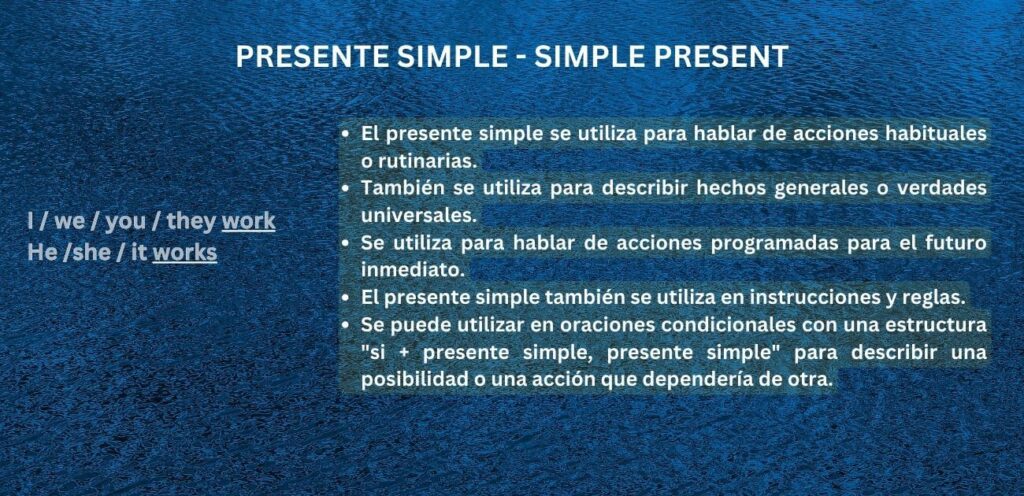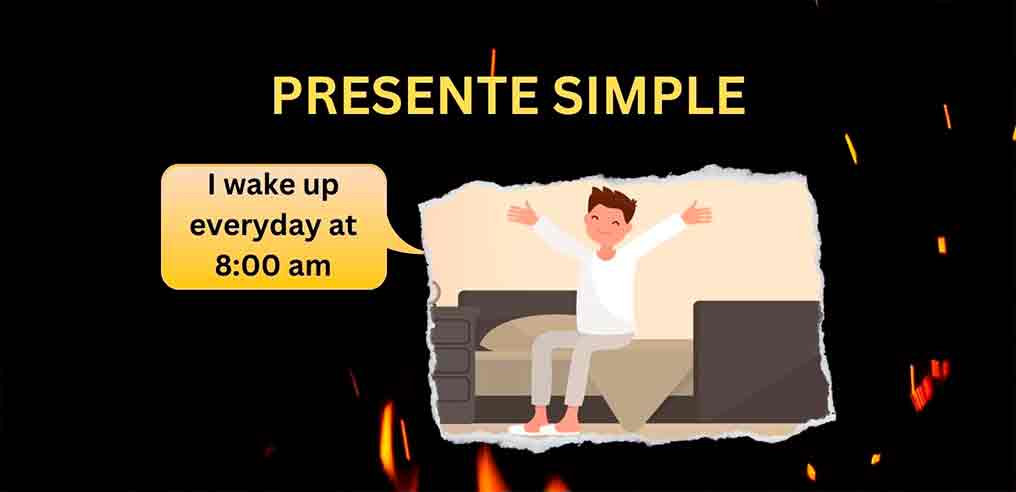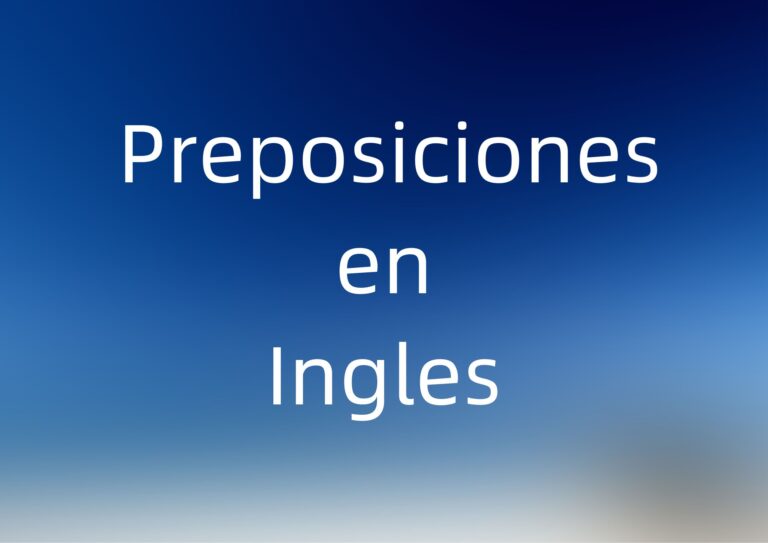Presente Simple en Inglés
Presente Simple en Ingles
El Simple Presente en inglés es un tiempo verbal utilizado para describir acciones que ocurren en el presente. Es muy similar al Presente del Indicativo en español, ya que ambos se utilizan para describir acciones que ocurren en el momento actual. Sin embargo, hay algunas diferencias en su uso. Por ejemplo, en inglés el Simple Presente se utiliza para describir acciones regulares y habituales, mientras que en español el Presente del Indicativo se utiliza para describir acciones generales. Además, en inglés el Simple Presente se utiliza para describir acciones que ocurren en el futuro cercano, mientras que en español se utiliza el Futuro para describir acciones futuras.
Table of Contents
ToggleEn resumen, el Simple Presente en inglés es un tiempo verbal muy importante para describir acciones en el presente, ya sean habituales o regulares, también para describir acciones que van a ocurrir en un futuro cercano, es fácil de usar y es esencial para comunicarse de manera efectiva en inglés.

Oraciones Afirmativas en Presente Simple
En inglés, las frases en Simple Presente se forma utilizando la forma base del verbo, es decir, el infinitivo sin “to” para la tercera persona del singular se añade -s, -es o -ies. Por ejemplo, el verbo “to play” (jugar) se convierte en “plays” en la tercera persona del singular.
- “s” se utiliza después del pronombre personal “he”, “she” o “it” y del verbo en infinitivo para formar la tercera persona del singular, por ejemplo: He walks (él camina) , She talks (ella habla)
- “es” se utiliza después del verbo en infinitivo que termina en “s”, “x”, “z”, “sh” o “ch” para formar la tercera persona del singular, por ejemplo: He watches (él mira), she kisses (ella besa)
- “ies” se utiliza después del verbo en infinitivo que termina en “y” precedido de una consonante para formar la tercera persona del singular, por ejemplo: He studies (él estudia)
Ejemplos:
- He goes to the movies once a month. (El va al cine una vez al mes)
- She watches the news every day. (Ella ve las noticias todos los días)
Es importante notar que algunos verbos irregulares no siguen esta regla y deben ser aprendidos de memoria, como “to be” que es “is” en tercera persona del singular.
Para “I”, “we”, “you” y “they”, el verbo se usa en la base forma. Por ejemplo.
En ese caso el verbo “play” no cambia.
- I play soccer. (Juego el fútbol)
- We play soccer. (Nosotros jugamos el fútbol)
- You play soccer. (Usted/ustedes juegan el fútbol)
- They play soccer. (Ellos juegan el fútbol)
Ejemplos de frases afirmativas en presente simple.
- I play soccer. (Juego al fútbol)
- I eat breakfast every morning. (Como desayuno todas las mañanas)
- I walk to work. (Camino al trabajo)
- He studies English every day. (El estudia inglés todos los días)
- He watches TV in the evening. (El ve la televisión por la noche)
- He listens to music on my way to work. (El escucha música en el camino al trabajo)
- She reads a book before bed. (Ella lee un libro antes de dormir)
- She goes to the gym three times a week. (Ella va al gimnasio tres veces a la semana)
- She plays the guitar on weekends. (Ella toca la guitarra los fines de semana)
- It works very well. (Éste funciona muy bien. “una maquina etc.”)
- It goes early. (este va temprano. “un bus etc”)
- It closes at 5:00 pm. (Este se Cierra a las 5:00. “un banco u officina etc.”)
- We cook dinner for my family. (Nosotros cocinamos la cena para mi familia)
- We work as a teacher. (Trabajamos como profesor)
- We live in a big city. (Vivimos en una ciudad grande)
- You drive to school. (Usted/ Tu maneja a la escuela)
- You love to travel. (Te encanta viajar)
- You speak two languages. (Yu/usted habla dos idiomas)
- They take the bus to work. (Ellos toman el autobús al trabajo)
- They drink coffee in the morning. (Ellos toman café en la mañana)
- They play video games in my free time. (Ellos juegan videojuegos en mi tiempo libre)
- They exercise every morning. (Ellos hacen ejercicio todas las mañanas)
Oraciones Negativas en Presente Simple
Es importante tener en cuenta que la estructura de las oraciones negativas y interrogativas en inglés es diferente de la estructura en español. Para crear una oración negativa en inglés, se utiliza la palabra auxiliar “do” o “does” seguida de la forma negativa del verbo “not”.
- Con los pronombres “I”, “we”, “you” y “they” se usa don’t (do not)
- Y con los pronombres “he”, “she” y “it” se usa doesn’t (does not)
Ejemplos de frases Negativas en Presente Simple.
- I don’t play soccer. (No juego al fútbol)
- I don’t eat meat. (No como carne)
- I don’t like horror movies. (No me gustan las películas de terror)
- I don’t like spicy food. (No me gusta la comida picante)
- He doesn’t smoke. (Él no fuma)
- He doesn’t wear glasses. (Él no usa lentes)
- He doesn’t have a pet. (Él no tiene una mascota)
- She doesn’t drink coffee. (Ella no toma café)
- She doesn’t have a car. (Ella no tiene un coche)
- She doesn’t watch TV. (Ella no ve la televisión)
- It doesn’t rain today. (No llueve hoy)
- It doesn’t snow in this city. (No nieva en esta ciudad)
- It doesn’t get dark early in the summer. (No oscurece temprano en el verano)
- We don’t go to the gym. (No vamos al gimnasio)
- We don’t speak French. (No hablamos francés)
- We don’t live in the same city. (No vivimos en la misma ciudad)
- You don’t study Spanish. (No estudias español)
- You don’t work on Sundays. (No trabajas los domingos)
- You don’t go to bed early. (No te acuestas temprano)
- They don’t play video games. (Ellos no juegan videojuegos)
- They don’t listen to hip-hop music. (Ellos no escuchan música hip-hop)
Oraciones Interrogativas (Preguntas) en Presente Simple
Para crear una oración interrogativa, se invierte el orden del sujeto y el verbo auxiliar.
Para realizar preguntas o frases interrogativas:
- Se utiliza “Do” al comienzo de la frase con los pronombres “I”, “we”, “you” y “they”
- Y con los pronombres “he”, “she” y “it” se usa “does”
Nota: “It” se usa para los objetos y los animales.
Ejemplos de frases Interrogativas (Preguntas) en Presente Simple con sus respectivas respuestas cortas y completas en forma afirmativa y negativa.
Do I eat breakfast every morning? (¿Como desayuno todas las mañanas?)
Respuesta corta:
Yes, I do.
No, I don’t
Respuesta completa:
Yes, I eat breakfast every morning.
No, I do not eat breakfast every morning.
Do I play the guitar on weekends? (¿Toco la guitarra los fines de semana?)
Respuesta corta:
Yes, I do.
No, I don’t
Respuesta completa:
Yes, I play the guitar on weekends.
No, I do not play the guitar on weekends
Do I take the bus to work? (¿Tomo el autobús al trabajo?)
Respuesta corta:
Yes, I do.
No, I don’t
Respuesta completa:
Yes, I take the bus to work.
No, I do not take the bus to work
Does he walk to work? (¿Camina al trabajo?)
Respuesta corta:
Yes, he does.
No, he doesn’t
Respuesta completa:
Yes, he walks to work.
No, he does not walk to work.
Does he cook dinner for his family? (¿Cocina la cena para su familia?)
Respuesta corta:
Yes, he does.
No, he doesn’t
Respuesta completa:
Yes, he cooks dinner for his family.
No, he does not cook dinner for his family.
Does he drink coffee in the morning? (¿Toma café en la mañana?)
Respuesta corta:
Yes, he does.
No, he doesn’t
Respuesta completa:
Yes, he drinks coffee in the morning.
No, he does not drink coffee in the morning.
Does she play video games in her free time? (¿Juega videojuegos en su tiempo libre?)
Respuesta corta:
Yes, she does.
No, she doesn’t
Respuesta completa:
Yes, she plays video games in her free time.
No, she does not play video games in her free time.
Does she work as a teacher? (¿Trabaja como profesora?)
Respuesta corta:
Yes, she does.
No, she doesn’t
Respuesta completa:
Yes, she works as a teacher.
No, she does not work as a teacher.
Does she study English every day? (¿Estudia inglés todos los días?)
Respuesta corta:
Yes, she does.
No, she doesn’t
Respuesta completa:
Yes, she studies English every day.
No, she does not study English every day.
Does she watch TV in the evening? (¿Ella ve la televisión por la noche?)
Respuesta corta:
Yes, she does.
No, she doesn’t
Respuesta completa:
Yes, she watches TV in the evening.
No, she does not watch TV in the evening.
Does he live in a big city? (¿Vive en una ciudad grande?)
Respuesta corta:
Yes, he does.
No, he doesn’t
Respuesta completa:
Yes, he lives in a big city.
No, he does not live in a big city.
Do we listen to music on our way to work? (¿Escuchamos música en nuestro camino al trabajo?)
Respuesta corta:
Yes, we do.
No, we don’t
Respuesta completa:
Yes, we listen to music on our way to work.
No, we do not listen to music on our way to work.
Do we drive to school? (¿Manejamos a la escuela?)
Respuesta corta:
Yes, we do.
No, we don’t
Respuesta completa:
Yes, we drive to school.
No, we do not drive to school.
Do we watch the news every day? (¿Vemos las noticias todos los días?)
Respuesta corta:
Yes, we do.
No, we don’t
Respuesta completa:
Yes, we watch the news every day.
No, we do not watch the news every day.
Do you read a book before bed? (¿Lee / Leen un libro antes de dormir?)
Respuesta corta:
Yes, you do.
No, you don’t
Respuesta completa:
Yes, you read a book before bed.
No, you do not read a book before bed.
Do you love to travel? (¿Les encanta viajar?)
Respuesta corta:
Yes, you do.
No, you don’t
Respuesta completa:
Yes, you love to travel.
No, you do not love to travel.
Do you exercise every morning? (¿Hacen ejercicio todas las mañanas?)
Respuesta corta:
Yes, I do.
No, I don’t
Respuesta completa:
Yes, I exercise every morning.
No, I dont exercise every morning
Do they go to the gym three times a week? (¿Van al gimnasio tres veces a la semana?)
Respuesta corta:
Yes, they do.
No, they don’t
Respuesta completa:
Yes, they go to the gym three times a week.
No, they do not go to the gym three times a week.
Do they speak two languages? (¿Hablan dos idiomas?)
Respuesta corta:
Yes, they do.
No, they don’t
Respuesta completa:
Yes, they speak two languages.
No, they do not speak two languages.
Do they go to the movies once a month? (¿Van al cine una vez al mes?)
Respuesta corta:
Yes, they do.
No, they don’t
Respuesta completa:
Yes, they go to the movies once a month.
No, they do not go to the movies once a month.
El Presente Simple en inglés es un tiempo verbal fácil de usar y es útil para describir rutinas, hábitos y acciones cotidianas. Es importante recordar la estructura de las oraciones negativas e interrogativas en inglés para poder comunicarse de manera efectiva en este idioma.
También es importante aprender verbos irregulares de memoria. Además, es importante practicar las respuestas afirmativas, negativas y interrogativas en el Simple Presente para desarrollar una comunicación efectiva en inglés. Con el entendimiento de estas reglas y la práctica adecuada, los estudiantes de español pueden sentirse más seguros y confiados al hablar y escribir en inglés en el Simple Presente.








Your point of view caught my eye and was very interesting. Thanks. I have a question for you.
Thank you for your kind words, I’m glad to hear that you found my point of view interesting. I’d be happy to answer your question, please feel free to ask.
Your article helped me a lot, is there any more related content? Thanks!
I’m glad to hear that my article was helpful to you! Please visit the index (Indice) page where you’ll find a list of all the articles. Furthermore, I’ll be publishing more articles that you can find in the “Recent Posts” section on the homepage.
Thank you for taking the time to read my blog posts and for your kind words! I am glad you found the content interesting and valuable. Please feel free to keep exploring the blog and let me know if there are any topics you would like me to cover in the future.